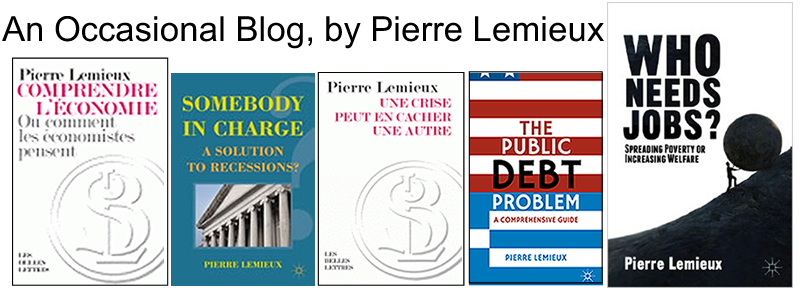Published in the Financial Post (www.nationalpost.com), January 10, 2013 [Note that the copy editor mistakenly removed the quote marks around “politics without romance,” which is an Buchanan’s expression.]
If one expression can capture the work of James Buchanan, who died yesterday aged 93, it is “politics without romance.” His approach generated a whole school of economic analysis called “Public Choice.” Closely associated to Buchanan were Gordon Tullock, Richard Wagner, Geoffrey Brennan, and other economists working mainly at the Virginia Polytechnic Institute and, later, George Mason University.
For his work in this field, Buchanan won the 1986 Nobel Prize in Economic Sciences.
Buchanan’s starting point was so simple enough that it now seems rather obvious. The people who make public or collective choices are just ordinary people like you and me: they are voters, politicians, and government bureaucrats. They are not disinterested angels. They have the same motivations as ordinary mortals, that is, to improve their situation in life. They achieve this sometimes by serving others, the ones whose support they need, sometimes by harming others, the ones whose money or submission they require.
For Buchanan, politics is exchange, just as economics is. There is a political market where politicians buy votes by selling the policies preferred by the majority of their constituents or, what amounts to the same, where voters sell their votes in order to buy what they want. To get their pet projects adopted, politicians then trade support among themselves. Bureaucrats sell their services to the politicians, at the highest price the market will bear. Collective choices are simply the result of these exchanges.
The problem, as Buchanan and his disciples found, is that lots of people end up not getting what they want or paying too much for want they get. The reason is that everybody demands free stuff from the government, and tries to shift the cost to somebody else.
Buchanan used the analytical tools of mainstream, “neoclassical” economics. But he pushed the standard economic idea that all benefits and costs are subjective even farther than orthodox economists do, as can be seen in his 1969 book Cost and Choice. As a consequence, many consider him a quasi-member of the Austrian school of economics (of which Friedrich Hayek, a fellow Nobel Prize winner, was a guiding light).
Buchanan was emphatically not a Keynesian. In Democracy in Deficit: The Political Legacy of Lord Keynes (1977), he and co-author Richard Wagner explained how the Keynesian apology of deficit financing had destroyed budget discipline since the 1960s, and how it would lead to endemic public deficits—a prescient prediction.
Such was Buchanan’s positive analysis of politics. As for his normative values, those that underlie his evaluation of different political arrangements, he eloquently put them forward in the two first pages of The Limits of Liberty: Between Anarchy and Leviathan (1975): “My approach is profoundly individualistic” (emphasis in original). “Each man counts for one, and that is that.” His normative theory of politics was thus the exact opposite of Plato’s government by the philosopher-king. For Buchanan, each individual must be his own ruler.
Buchanan believed that government is necessary to produce public goods (mainly security, but a few others too), hence politics as exchange. The problem of this sort of exchange is that the majority (or perhaps a minority, like bureaucrats) will be tempted to exploit the rest of the population. Rational individuals will want to protect themselves against this danger with a unanimous, if only implicit, social contract that constitutionally limits what the state can do. We must, as the subtitle of The Limits of Liberty indicates, stand “between anarchy and Leviathan.”
Leviathan (the all-powerful Hobbesian state) remains a constant danger. He must be chained by constitutional rules. All politics must be informed by a strong mistrust for government. In The Power to Tax, a 1980 book he wrote with co-author Geoffrey Brennan, Buchanan inquired into the fiscal rules necessary to prevent Leviathan from expropriating taxpayers.
Buchanan defined himself as a liberal in the classical sense. In standard terms, he was a moderate libertarian, which means that he was neither a “liberal” (in the American sense) nor a conservative. In a 2001 interview, he admits that in England or any other class-oriented European society, he might have been a socialist. Individual liberty was what Buchanan was interested in; equality of opportunity came a close second. Hence the importance of free markets.
Of course, market failures exist, but government failures are often much worse. Referring to Andersen’s famous tale, Buchanan wrote: “Public choice is like the small boy who said that the king really has no clothes.”
Thanks to James Buchanan, many—perhaps most—economists and political scientists have stopped naively looking at the state as if it were manned by disinterested angels working tirelessly to bring happiness to 100% of their constituents. His enormous influence on economics and politics will be a lasting one.
